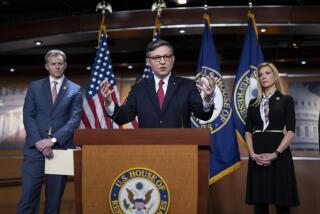Congress extends payroll tax break
Congress swiftly passed a bill Friday extending the payroll tax cut through the end of the year, ending a months-long tug of war with an unusual bipartisan accord.
The House passed the bill on a 293 to 132 vote, with Democrats helping to put the legislation over the top in the face of 91 Republican no votes. A few minutes later, the Senate passed the legislation, 60 to 36.
President Obama welcomed the passage of the bill, which also includes an extension of long-term unemployment benefits and blocks a scheduled 27% cut in Medicare payments to doctors.
“Congress did the right thing and voted to make sure that taxes would not go up on middle-class families at the end of this month,” Obama said while visiting a Boeing plant in Everett, Wash. He said he would sign the legislation right away.
For months, the two parties had been at odds over the legislation, with Republicans demanding that the cost of the bill be fully offset by spending cuts. But they rejected a Democratic plan to impose a surtax on the wealthy to pay for the bill. And Democrats seized the opening to argue that Republicans were content to let millions of middle-class Americans be hit by a tax increase in the midst of a sluggish economy.
The impasse was broken this week after House Speaker John A. Boehner (R-Ohio) and his lieutenants dropped their insistence that the tax-cut extension be paid for with spending reductions. Boehner’s shift was an implicit acknowledgment that Republicans were taking a beating on the issue, and that it was time to move on to something else.
The payroll tax cut trims 2 percentage points off workers’ contribution to Social Security. That amounts to an average of about $20 a week per worker. The retirement fund will be replenished from the general fund.
Overall, the package adds $89.3 billion to the federal deficit over 10 years, according to the Congressional Budget Office.
Under the legislation, the non-tax-cut provisions will be paid for partly by reducing the government’s contributions to the pensions of federal employees hired starting next year; auctioning off parts of the wireless spectrum, which can be used in expanding broadband networks; and using funds that originally had been approved as part of Obama’s healthcare law for public health and prevention programs.
While Boehner succeeded in bringing an end to the tax battle, Democrats vowed to keep pounding away on the theme of income inequality — an issue that, according to polls, is popular among Americans who largely agree that wealthy households should contribute more.
Sen. Charles E. Schumer (D-N.Y.) said Democrats would roll out votes on Obama proposals, including a tax increase on millionaires as well as the Buffett rule, which is designed to ensure that wealthy Americans don’t pay lower tax rates than the less well-off.
Republicans, meanwhile, will continue to focus on nagging uncertainty about the economy and Obama’s handling of it. In recent days, GOP leaders have said the payroll tax break is an economic aid package that was needed because the economy is still struggling.
“This is an economic relief bill — not a growth bill,” Boehner said after the bill passed. “The only reason the provisions at the core of this measure are even necessary is because the president’s economic policies have failed.”
That view could be reinforced, GOP aides said, if gas prices rise this spring and summer as expected.
Legislators from Virginia and Maryland, where large numbers of federal employees live, voted against the bill because of the reductions in pension contributions.
More to Read
Start your day right
Sign up for Essential California for news, features and recommendations from the L.A. Times and beyond in your inbox six days a week.
You may occasionally receive promotional content from the Los Angeles Times.






